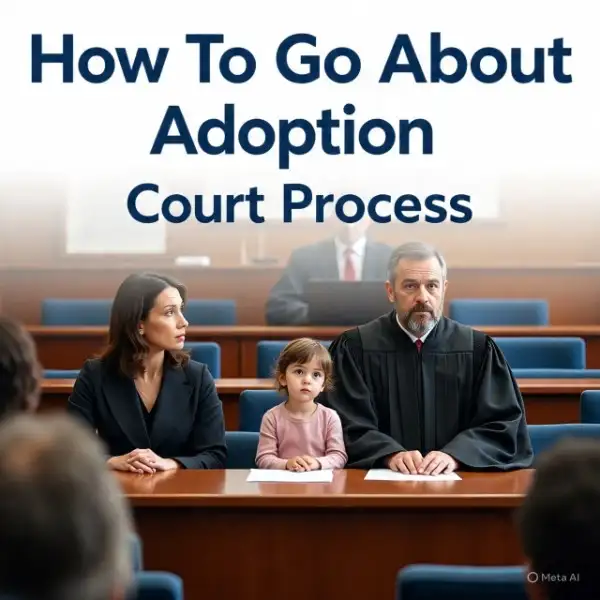Adoption Court Process: 9 Frugal Things To Consider Now

A Surprising Statistic About the Adoption Court Proces.
Most people are shocked to learn that the average adoption court process in the United States can take anywhere from 12 to 36 months depending on the adoption type.
According to the U.S. Department of Health and Human Services, nearly 40% of prospective adoptive parents underestimate the length and costs associated with finalizing adoption in court. This underestimation often leads to emotional and financial stress that could have been avoided with proper preparation.
The reality is even more complex when you consider that these timelines represent only the court portion of the adoption journey. The entire adoption process, including matching with a child, completing home studies, and waiting periods, can extend these timeframes significantly.
For families pursuing international adoption, the process can stretch beyond three years when factoring in country-specific requirements, visa processing, and potential policy changes in the child’s country of origin.
Why Understanding the Adoption Court Process Matters
The adoption court process is not just about legal paperwork; it represents the transition of a child into a permanent family. Every state has its own requirements, yet all share a central goal: protecting the child’s best interest. Families who fully grasp the court requirements save time, money, and unnecessary setbacks.
Industry experts, including adoption attorney Elizabeth Bartholet, emphasize that preparedness reduces both legal fees and the risk of delays. Knowing what to expect makes the journey less daunting and ensures smoother finalization.
Beyond the practical benefits, understanding the court process provides emotional preparation for families. The courtroom can feel intimidating, especially for first-time adoptive parents. Judges may ask detailed questions about parenting philosophy, financial stability, and long-term plans for the child.
Families who understand these expectations can prepare thoughtful responses that demonstrate their readiness for parenthood.
The court process also serves as a final validation of the family’s commitment. Unlike biological parenthood, adoptive families must prove their capability and dedication through extensive documentation and evaluation.
This scrutiny, while sometimes overwhelming, ultimately ensures that children are placed in stable, loving homes where they can thrive.
The #1 Mistake Families Make in Adoption Court
The most common mistake families make during the adoption court process is failing to gather and organize all required documentation ahead of time. Courts often require extensive background checks, medical records, financial statements, and home study reports. Submitting incomplete paperwork almost always causes delays.
This mistake is particularly costly because court schedules are often booked months in advance. Missing a court date due to incomplete documentation can push the finalization back by three to six months, depending on the court’s availability.
During this extended waiting period, families continue paying legal fees, agency costs, and in some cases, temporary care expenses.
The emotional toll of delays cannot be understated. Children in pre-adoptive placements may experience uncertainty about their future, while families endure prolonged stress and anticipation. Some children, particularly older ones, may interpret delays as rejection or instability, potentially affecting their attachment to the adoptive family.
Step-by-Step Solution:
The best way to avoid this mistake is to create a legal adoption binder or digital folder well before the court hearing. Start with the home study documents, then include background check clearances, medical exam results, and financial disclosures. Families can use an attorney’s checklist or court-provided guidance.
Create a comprehensive checklist that includes:

- Original birth certificates for all family members.
- Marriage certificate (if applicable).
- Divorce decrees (if applicable).
- Employment verification letters.
- Tax returns for the past three years.
- Bank statements and investment records.
- Insurance policies and beneficiary information.
- References from employers, friends, and community members.
- Medical clearances for all family members.
- Background check results from FBI, state, and local agencies.
- Home study report with all required updates.
- Post-placement visit reports.
- Any court orders related to the adoption
For example, a couple adopting from foster care in Ohio reduced their processing time by four months simply because they submitted a complete package on the first attempt. Another family in Texas reported saving over $1,200 in additional legal fees by staying organized and avoiding repeat submissions.
These success stories highlight how preparation directly translates to financial and emotional savings.
Adoption Court Process: 9 Frugal Things To Note Now:
1. Court Fees Vary Widely Between Adoption Types and States
One of the most overlooked aspects of the adoption court process is how fees fluctuate. Domestic infant adoptions typically incur higher court filing fees than foster care adoptions.
International adoption may require multiple court appearances in both the child’s country of origin and the U.S. According to Child Welfare Information Gateway, families should budget anywhere from $500 to $3,000 in court-related costs alone.
Planning for these expenses ahead of time prevents financial strain and allows families to allocate resources more effectively.
State-by-state variations can be dramatic. For instance, filing fees in California can exceed $1,500, while similar proceedings in Mississippi may cost less than $400.
Some states offer fee waivers for families with demonstrated financial need, particularly in Foster Care. Research your state’s specific fee structure and investigate available assistance programs early in the process.
Additional costs often arise from document preparation, certified copies, and notarization fees. These seemingly minor expenses can accumulate to several hundred dollars. International adoptions may require document authentication through consulates or embassies, adding another layer of expense that families should anticipate.
2. Timing Directly Impacts Overall Costs of Adoption
The longer the adoption court process takes, the more families spend on legal representation, travel, and agency coordination. For instance, each additional month of delay can add $200 to $500 in legal fees.
Data from the Evan B. Donaldson Adoption Institute confirms that timely preparation reduces costs by as much as 20%. Families can save significantly by submitting all requirements promptly and maintaining clear communication with attorneys.
Extended timelines also affect work schedules and travel arrangements. Families may need to request additional time off for court appearances, potentially impacting income. Those pursuing international adoption may face currency fluctuations that increase costs over time, making prompt completion financially advantageous.
Consider the ripple effects of delays on other family members. Siblings may experience extended periods of uncertainty, and extended family members who have prepared for the new addition may face emotional fatigue from prolonged waiting periods.
3. Legal Representation is Crucial But Can Be Budget-Friendly
While some families attempt to navigate the adoption court process without legal help, experts strongly advise against it. However, affordable options exist.
Many states provide court-appointed counsel for foster care adoptions, while nonprofit organizations like the Dave Thomas Foundation offer resources for reduced-cost legal support. A skilled attorney ensures compliance with state laws, reducing the risk of costly appeals or contested hearings.
When selecting legal representation, consider attorneys who specialize in adoption law rather than general family law practitioners. Specialists understand the nuances of adoption regulations and can navigate complex situations more efficiently. Some attorneys offer flat-fee arrangements for straightforward cases, providing cost predictability for families on tight budgets.
Legal aid societies and law school clinics sometimes provide adoption assistance at reduced rates. While these options may involve working with supervised law students or newer attorneys, they can offer quality representation at affordable prices for families who qualify based on income requirements.
4. Home Studies Influence Final Court Decisions
Every adoption court process requires a completed home study, and its quality can directly influence the judge’s decision. Skipping recommended updates or failing to prepare for home visits can delay proceedings.
A 2021 study from the National Council for Adoption revealed that families who kept updated home study reports experienced 30% faster finalization. Frugality here means investing upfront in a comprehensive home study to avoid repeated, costly reviews.
Home studies typically require updates if more than 12 months pass between completion and court finalization. These updates involve additional social worker visits and fees, making timely court completion financially beneficial.
Some agencies offer package deals that include one free update, making them more cost-effective for families anticipating longer timelines.
Prepare thoroughly for home study visits by addressing any safety concerns in advance. Install required safety equipment, organize important documents, and ensure all family members understand the process.
Children already in the home should be prepared to interact naturally with the social worker, as their comfort level can positively influence the overall assessment.
5. International Adoptions Carry Hidden Court-Related Costs
Parents adopting internationally must consider both foreign and domestic court expenses. Even after securing adoption abroad, U.S. courts require a re-adoption or recognition process to ensure legal status. Failing to complete this step can jeopardize citizenship and inheritance rights.
According to the U.S. Citizenship and Immigration Services, families should prepare for additional fees averaging $1,500. Budgeting for both foreign and U.S. court processes prevents last-minute financial shocks.
International adoptions also involve translation costs for documents, which can range from $200 to $800 depending on the volume of paperwork and language complexity. Some countries require apostille certification for U.S. documents, adding authentication fees and processing time.
Travel costs for court appearances abroad can be substantial, particularly if multiple trips are required. Some countries mandate that adoptive parents remain in-country for specific periods before finalization, requiring extended accommodation and living expenses that families should budget for in advance.
6. Foster Care Adoptions Are the Most Cost-Effective
The adoption court process for foster care is often the most budget-friendly. Federal and state subsidies frequently cover filing fees and attorney costs. In fact, the Children’s Bureau reports that over 60% of foster care adoptions finalize with little or no cost to the adoptive family. Choosing foster care adoption not only reduces financial burdens but also provides a permanent home for children in need.
Many states offer ongoing subsidies for children adopted from foster care, including monthly payments, medical coverage, and educational assistance. These benefits can continue until age 18 or beyond for children with special needs, providing long-term financial support for adoptive families.
Foster care adoption also typically involves shorter court processes since parental rights have often been terminated before placement. This efficiency reduces legal fees and allows families to focus on bonding with their new child rather than navigating lengthy court procedures.
7. Documentation Errors Are Expensive and Time-Consuming
Small mistakes, such as misspelled names or incorrect dates on forms, can stall the adoption court process. In some states, families must re-file paperwork, incurring additional fees. A North Carolina study found that 25% of delayed adoptions were caused by clerical errors. Double-checking every document before submission and working closely with legal professionals can save both time and money.
Common errors include inconsistent name spellings across documents, outdated addresses, expired background checks, and missing signatures or notarizations. Create a detailed review process that includes multiple people checking each document for accuracy and completeness.
Consider hiring a professional document review service or asking your attorney to conduct a final check before submission. While this may involve additional upfront costs, it can prevent expensive delays and re-filing fees that far exceed the review expense.
8. Judges Have Final Say on Adoption Approval
During the adoption court process, judges review not only paperwork but also testimonies and home study evaluations. If doubts arise about a family’s preparedness, additional hearings may be required, prolonging finalization.
According to a report from the American Bar Association, well-prepared families with organized records and positive home studies finalize on average three months earlier than unprepared counterparts.
Prepare for potential judge questions about parenting philosophy, discipline strategies, financial planning, and support systems.
Practice articulating your commitment to the child and your understanding of adoption-specific parenting challenges. Judges appreciate honest, thoughtful responses that demonstrate genuine preparation for adoptive parenthood.
Dress professionally for court appearances and arrive early to familiarize yourself with the courtroom environment. Bring multiple copies of all required documents, even if they’ve been previously submitted, as courts sometimes experience filing issues or request additional copies during proceedings.
9. Appeals and Contested Cases Increase Financial Pressure
If birth parents contest an adoption or if legal rights termination is unclear, the court process becomes lengthier and more expensive.
An appeal can add $5,000 to $10,000 in legal costs. Experts recommend ensuring all parental rights have been fully terminated before proceeding to court. Families who clarify legal standings beforehand minimize the likelihood of costly disputes.
Contested cases require extensive legal preparation, expert witnesses, and potentially multiple court appearances. These situations demand experienced legal representation, which comes at a premium cost. Some contested cases can extend for years, creating enormous financial and emotional strain on adoptive families.
Consider purchasing legal insurance or setting aside emergency funds specifically for potential legal challenges. While most adoptions proceed smoothly, having financial resources available for unexpected legal complications provides peace of mind and ensures adequate representation if conflicts arise.
Common Mistakes During the Adoption Court Process
Several common mistakes derail families during the adoption court process. The first is underestimating costs, leading to unexpected financial pressure.
Create a comprehensive budget that includes a 20% contingency fund for unexpected expenses. Track all adoption-related costs to identify areas where you might save money or need additional resources.
Another mistake is ignoring timelines; failing to respond promptly to court notices causes delays. Establish a system for tracking important dates and deadlines. Set calendar reminders well in advance of due dates to ensure adequate preparation time.
Many families rely solely on agency guidance without consulting independent legal experts. While agencies provide valuable support, their primary loyalty may be to completing the placement rather than protecting your specific interests.
An independent attorney can provide objective advice and ensure your rights are fully protected throughout the process.
Communication breakdowns between team members can also create problems. Maintain regular contact with your attorney, social worker, and agency coordinator. Establish clear communication preferences and ensure all team members have current contact information for your family.
Final Thoughts:

Understanding the adoption court process allows families to plan wisely, save money, and minimize delays.
By avoiding common mistakes, seeking expert guidance, and staying proactive, families not only protect their finances but also safeguard the emotional well-being of the child awaiting permanence. Frugal preparation ensures the process is not only legally sound but also deeply rewarding for everyone involved.
Remember that adoption is ultimately about creating families and providing children with loving, permanent homes. While the legal and financial aspects can seem overwhelming, thousands of families successfully navigate this process each year.
Your careful preparation and commitment to understanding the requirements will contribute to a positive outcome for both your family and the child you’re welcoming home.
Consider connecting with other adoptive families in your community or online support groups. These connections provide valuable practical advice and emotional support throughout the court process and beyond. Many experienced adoptive families are willing to share their knowledge and help newcomers avoid common pitfalls.
The adoption court process represents the final legal step in a journey that transforms lives forever. Approach it with preparation, patience, and the understanding that each requirement serves to protect the best interests of the child who will become a permanent part of your family.




